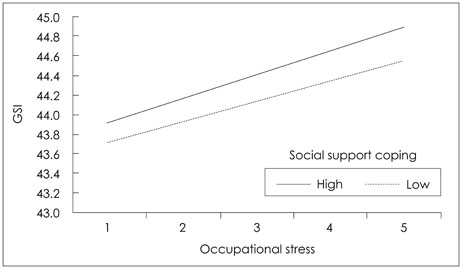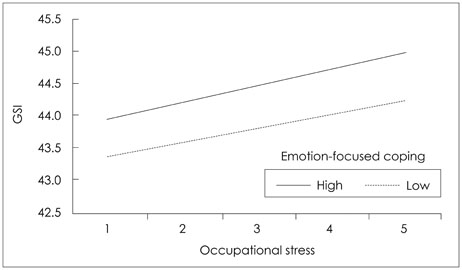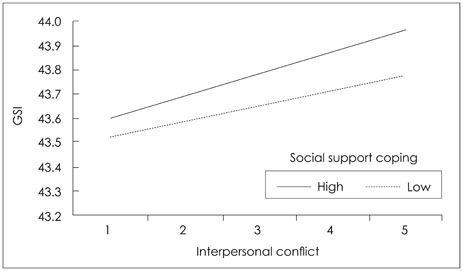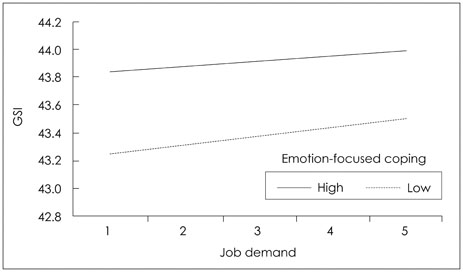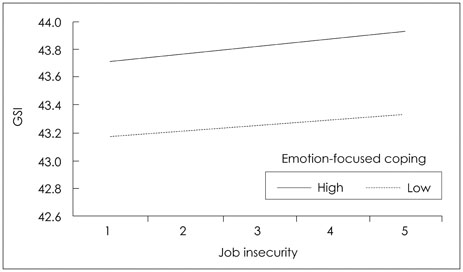J Korean Neuropsychiatr Assoc.
2015 Nov;54(4):587-595. 10.4306/jknpa.2015.54.4.587.
Moderating Effect of Stress Coping Strategies on the Relationship between a National Statistics Office Workers' Occupational Stress and Mental Health
- Affiliations
-
- 1Department of Psychiatry, Naju National Hospital, Naju, Korea. yoonbh@chollian.net
- 2Department of Psychiatry, Jeju National University Hospital, Jeju, Korea.
- 3Honam Regional Statistics Office, Gwangju, Korea.
- KMID: 2149343
- DOI: http://doi.org/10.4306/jknpa.2015.54.4.587
Abstract
OBJECTIVES
This study examined the moderating effects of stress coping strategies on the relationship between occupational stress of national statistical office workers and mental health.
METHODS
Subjects were 133 workers at a regional statistics office. Occupational stress, stress coping strategies, and mental health were examined using the Korean Occupational Stress Scale (KOSS), Ways of Coping Checklist, and The Symptom Check-List-90-R. Stress coping strategies were composed of problem-focused coping, social support coping, emotion-focused coping, and wishful thinking coping.
RESULTS
Moderated regression indicated that the social support coping and emotion-focused coping style positively moderated the relationship between occupational stress and mental health in national statistical office workers. The social support coping style positively moderated the relationship between interpersonal conflict (KOSS subscale) and mental health in national statistical office workers. The emotion-focused coping style positively moderated the relationship between job insecurity (KOSS subscale) and mental health in national statistical office workers. The emotion-focused coping style negatively moderated the relationship between job demand (KOSS subscale) and mental health in national statistical office workers.
CONCLUSION
The implications of this study included that negative results due to high occupational stress can be varied by use of suitable stress coping strategies.
Keyword
MeSH Terms
Figure
Reference
-
1. Cooper CL, Marshall J. Occupational sources of stress: a review of the literature relating to coronary heart disease and mental ill health. J Occup Psychol. 1976; 49:11–28.
Article2. Caplan RD. Person-environment fit theory and organizations: commensurate dimensions, time perspectives and mechanisms. J Vocat Behav. 1987; 31:248–267.
Article3. Kahn RL, Wolfe DM, Quinn RP, Snoek JD, Rosenthal RA. Organizational stress: studies in role conflict and ambiguity. New York: John Wiley;1964.4. Chung YK, Kim HR, Park SY, Hong JY, Koh SB, Chang SJ. The effect of job stress on umemployment. Korean J Occup Environ Med. 2007; 19:115–124.
Article5. Lee EH, Chang SJ, Kim HO, Roh J, Park EJ, Won JU. Relationship between job stress and turnover of registered nurses in a university hospital. Korean J Occup Environ Med. 2007; 19:93–104.
Article6. Cho JJ, Kim JY, Byun JS. Occupational stress on risk factors for cardiovascular diseases and metabolic syndrome. Korean J Occup Environ Med. 2006; 18:209–220.
Article7. Koh SB, Chang SJ, Park JK, Park JH, Son DK, Hyun SJ, et al. Occupational stress and risk factors for cardiovascular diseases. Korean J Occup Environ Med. 2005; 17:186–198.
Article8. Hwang CK, Koh SB, Chang SJ, Park CY, Cha BS, Hyun SJ, et al. Occupational stress in relation to cerebrovascular and cardiovascular disease: longitudinal analysis from the NSDSOS project. Korean J Occup Environ Med. 2007; 19:105–114.
Article9. Bongers PM, de Winter CR, Kompier MA, Hildebrandt VH. Psychosocial factors at work and musculoskeletal disease. Scand J Work Environ Health. 1993; 19:297–312.
Article10. Melchior M, Caspi A, Milne BJ, Danese A, Poulton R, Moffitt TE. Work stress precipitates depression and anxiety in young, working women and men. Psychol Med. 2007; 37:1119–1129.
Article11. Wang J. Work stress as a risk factor for major depressive episode(s). Psychol Med. 2005; 35:865–871.
Article12. Yu KY, Lee KJ, Min KB, Park KC, Chai SK, Park JB. Association between job stress and mental health among workers in a large company. J Korean Soc Occup Environ Hyg. 2011; 21:146–155.13. Shigemi J, Mino Y, Ohtsu T, Tsuda T. Effects of perceived job stress on mental health. A longitudinal survey in a Japanese electronics company. Eur J Epidemiol. 2000; 16:371–376.14. Kim JE. The impact of job stress on mental health of social workers [dissertation]. Daegu: Kyungpook National University;2012.15. Lee SW, Kim KS, Kim TG, Ryu HW, Lee MY, Won YL, et al. The relationship between job stress and depressive symptoms in migrant workers in Kyung-gi Province in Korea. Korean J Occup Environ Med. 2009; 21:76–86.
Article16. Lim HH. Job stress and depression of male industry workers [dissertation]. Suwon: Ajou University;2007.17. Kim TG. The effect of job stress for depression in clinical nurses: focusing on the mediating dffects of coping strategies and social support [dissertation]. Chungju: Chungju National University;2012.18. Goldenhar LM, Swanson NG, Hurrell JJ Jr, Ruder A, Deddens J. Stressors and adverse outcomes for female construction workers. J Occup Health Psychol. 1998; 3:19–32.
Article19. Danna K, Griffin RW. Health and well-being in the workplace: a review and synthesis of the literature. J Manag. 1999; 25:357–384.
Article20. Gebhardt DL, Crump C. Employee fitness and wellness programs in the workplace. Am Psychol. 1990; 45:262–272.
Article21. Lazarus RS, Folkman S. Stress, appraisal, and coping. New York: Springer Publishing Company;1984.22. Aldwin CM, Revenson TA. Does coping help? A reexamination of the relation between coping and mental health. J Pers Soc Psychol. 1987; 53:337–348.
Article23. Chang SJ, Koh SB, Kang D, Kim SA, Kang MG, Lee CG, et al. Developing an Occupational Stress Scale for Korean employees. Korean J Occup Environ Med. 2005; 17:297–317.
Article24. Kim JH. Relations of perceived stress, cognitive set, and coping behaviors to depression [dissertation]. Seoul: Seoul National University;1987.25. Sim SJ. The effect on stress level by assertiveness and the way of stress coping [dissertation]. Buchoen: Catholic University;1995.26. Derogatis LR, Lipman RS, Covi L. SCL-90: an outpatient psychiatric rating scale--preliminary report. Psychopharmacol Bull. 1973; 9:13–28.27. Kim JH, Kim GI. The standardization study of symptom checklist-90-revision in Korea III. Ment Health Res. 1984; 2:278–311.28. Kim KI, Won HT, Lee JH, Kim KY. Standardization study of symptom check list-90 in Korea I: characteristics of normal responses. J Korean Neuropsychiatr Assoc. 1978; 17:449–458.29. Baron RM, Kenny DA. The moderator-mediator variable distinction in social psychological research: conceptual, strategic, and statistical considerations. J Pers Soc Psychol. 1986; 51:1173–1182.
Article30. Aiken LS, West SG, Reno RR. Multiple regression: testing and interpreting interactions. Newbury Park: Sage Publications;1991.31. Shim JS. A study on the relationship between the job stress of the private security guards, mental health and stress-coping 2010. Korean J Ind Organ Psychol. 2010; 23:733–754.32. Jeong YC. A study on the stress and mental health status in shipbuilding male workers [dissertation]. Busan: Kosin University Graduate School;2007.33. Felton BJ, Revenson TA, Hinrichsen GA. Stress and coping in the explanation of psychological adjustment among chronically ill adults. Soc Sci Med. 1984; 18:889–898.
Article34. Kim BR, Park YS. The moderating effect of teachers' stress management in relation to work environment with job engagement and burnout respectively. Korean J Stress Res. 2012; 20:199–208.35. Gong SJ, Lee EH. Mediation effect of coping between life stress and depression in female college students. Korean J Woman Psychol. 2006; 11:21–40.36. Mitchell RE, Hodson CA. Coping with domestic violence: social support and psychological health among battered women. Am J Community Psychol. 1983; 11:629–654.
Article37. Shin SW. Study on the effects of life and job experiences on the level of stress on police officers [dissertation]. Iksan: Wonkwang University;2006.38. Jeong EJ. Emotion and stress coping strategies as a moderator in relation between job stressors and job burnout [dissertation]. Seoul: Korea University;2004.39. Conway VJ, Terry DJ. Appraised controllability as a moderator of the effectiveness of different coping strategies: a test of the goodness of fit hypothesis. Aust J Psychol. 1992; 44:1–7.
Article40. Endler NS, Speer RL, Johnson JM, Flett GL. Controllability, coping, efficacy, and distress. Eur J Personal. 2000; 14:245–264.
Article41. Park SB. The research on the job stress the way of handling the stress and job satisfaction of workers in social welfare facilities of Jeju: according to sociodemographic variables [dissertation]. Jeju: Jeju National University;2015.42. Lee EH, Lee JH. Relationship of teachers' job stressors to psychological adjustment: the moderating effect of problem-focused coping and emotion-focused coping. Korean J Health Psychol. 2001; 6:145–175.43. Lee OJ. Eysenck's personality dimensions and stress coping styles as predictors of school adjustment in high school students. Korean J Soc Psychol. 2003; 17:77–85.44. Nam MH. Effect of job stress,and coping strategy on the job satisfaction in a hospital works [dissertation]. Seoul: Catholic University;2002.45. Kang MS. Mediating effect of coping strategies on the relationship between job stress and burnout of kindergarten teachers [dissertation]. Busan: Pukyong National University;2012.
- Full Text Links
- Actions
-
Cited
- CITED
-
- Close
- Share
- Similar articles
-
- Relationship between Depression and Stress-Coping Strategies in Public Enterprise Workers Whose Workplaces Were Relocated to a New Environment
- The Mental Health and Occupational Characteristic of Horse Stable Hand Workers in Korea
- The Moderating Effect of the Leisure Satisfaction in the Job Stress on Job Satisfaction of Nurses on Shift Work
- Job Stress and Stress Coping Strategy among Workers in A Regional Statistics Office : A Preliminary Study
- Relationship between Traumatic Events, Stress Coping Strategies and Post-Traumatic Stress Symptoms among Social Workers in Public Sector

